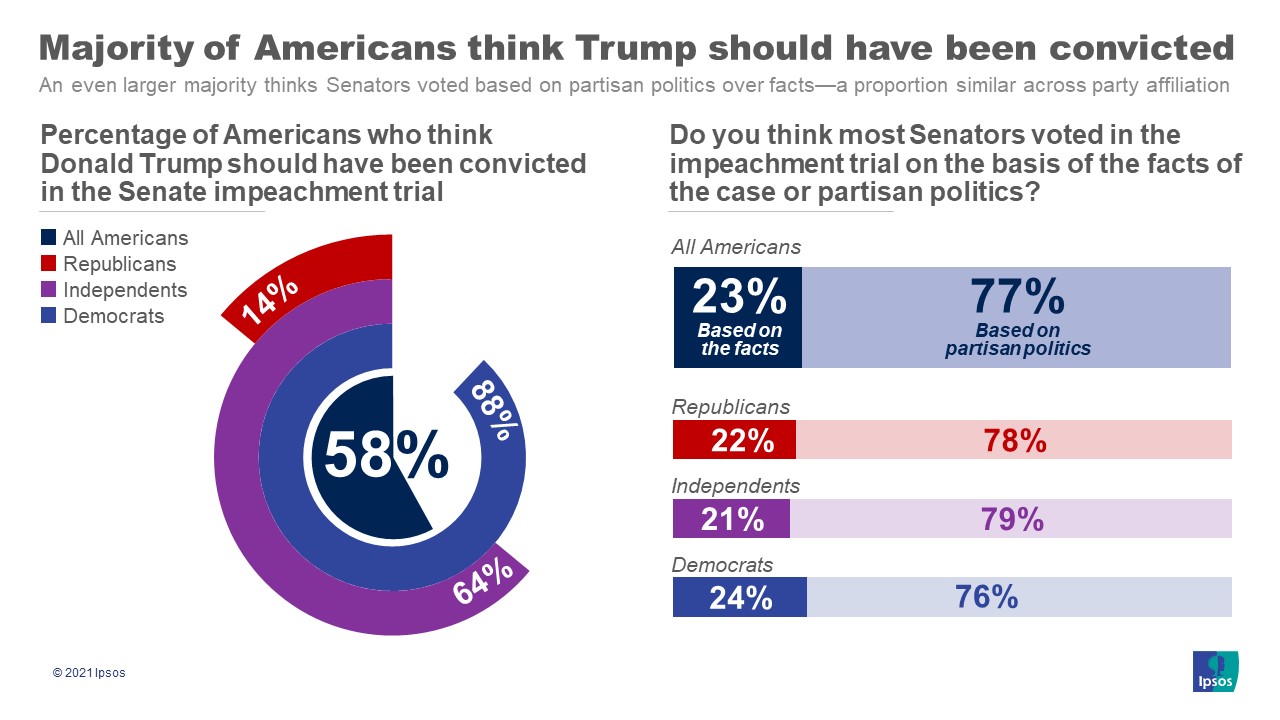After conclusion of impeachment trial, most Americans feel Trump should have been convicted
Washington, DC, February 15, 2021
Nearly three in five Americans believe President Donald Trump should have been convicted in the Senate impeachment trial, according to a new ABC News/Ipsos poll that fielded immediately after the trial concluded. A similar number believe the evidence presented in the trial was strong; however, a strong majority believe the senators voted not based on facts in the case, but on partisan politics.
1. Most Americans believe Trump should have been convicted in the second impeachment trial. However, partisans remained as deeply divided as they were before the trial began.
- Overall, 58% believe Trump should have been convicted, and a similar number (61%) say the charges were serious enough for him to be impeached and put on trial.
- While a vast majority of Democrats (88%) and most independents (64%) believe Trump should have been convicted, just 14% of Republicans agree.
- These numbers do not reflect any growth or change in levels of support for impeachment compared to the time period before the trial.

2. While most believe the evidence against Trump was serious, ultimately the American public feels the senators acted from a place of partisanship, not fact.
- Fifty-six percent rate the evidence against Trump as strong, compared to 37% who say it was weak.
- This breaks out along similar partisan lines as the belief in conviction, with a strong majority of Democrats believing the evidence is strong, and very few Republicans agreeing.
- More than three-quarters (77%) believe the senators voted based on partisan politics, compared to 23% who said they voted based on the facts in the case.
- This is one area of agreement for Democrats and Republicans: nearly equal numbers believe the senators voted based on politics.
About the Study
This ABC News/Ipsos poll was conducted February 13 to February 14, 2021, by Ipsos using the probability-based KnowledgePanel®. This poll is based on a nationally representative probability sample of 547 general population adults age 18 or older.
The survey was conducted using KnowledgePanel, the largest and most well-established online probability-based panel that is representative of the adult US population. Our recruitment process employs a scientifically developed addressed-based sampling methodology using the latest Delivery Sequence File of the USPS – a database with full coverage of all delivery points in the US. Households invited to join the panel are randomly selected from all available households in the U.S. Persons in the sampled households are invited to join and participate in the panel. Those selected who do not already have internet access are provided a tablet and internet connection at no cost to the panel member. Those who join the panel and who are selected to participate in a survey are sent a unique password-protected log-in used to complete surveys online. As a result of our recruitment and sampling methodologies, samples from KnowledgePanel cover all households regardless of their phone or internet status and findings can be reported with a margin of sampling error and projected to the general population.
The study was conducted in both English and Spanish. The data were weighted to adjust for gender by age, race/ethnicity, education, Census region, metropolitan status, household income, and party identification. The demographic benchmarks came from 2019 American Community Survey (ACS) from the US Census Bureau. Party ID benchmarks are from recent ABC News/Washington Post telephone polls. The weighting categories were as follows:
- Gender (Male, Female) by Age (18–29, 30–44, 45–59, and 60+)
- Race/Hispanic Ethnicity (White Non-Hispanic, Black Non-Hispanic, Other or 2+ Races Non-Hispanic, Hispanic)
- Education (High School graduate or less, Some College, Bachelor and beyond)
- Census Region (Northeast, Midwest, South, West)
- Metropolitan status (Metro, non-Metro)
- Household Income (Under $25,000, $25,000-$49,999, $50,000-$74,999, $75,000-$99,999, $100,000-$149,999, $150,000+)
- Party ID (Democrat, Republican, Independent, Something else)
The margin of sampling error is plus or minus 4.8 percentage points at the 95% confidence level, for results based on the entire sample of adults. The margin of sampling error takes into account the design effect, which was 1.34. The margin of sampling error is higher and varies for results based on sub-samples. In our reporting of the findings, percentage points are rounded off to the nearest whole number. As a result, percentages in a given table column may total slightly higher or lower than 100%. In questions that permit multiple responses, columns may total substantially more than 100%, depending on the number of different responses offered by each respondent.
About Ipsos
Ipsos is the world’s third largest market research company, present in 90 markets and employing more than 18,000 people.
Our passionately curious research professionals, analysts and scientists have built unique multi-specialist capabilities that provide true understanding and powerful insights into the actions, opinions and motivations of citizens, consumers, patients, customers or employees. We serve more than 5000 clients across the world with 75 business solutions.
Founded in France in 1975, Ipsos is listed on the Euronext Paris since July 1st, 1999. The company is part of the SBF 120 and the Mid-60 index and is eligible for the Deferred Settlement Service (SRD).
ISIN code FR0000073298, Reuters ISOS.PA, Bloomberg IPS:FP www.ipsos.com



